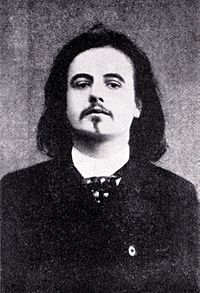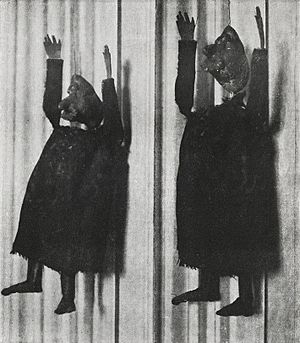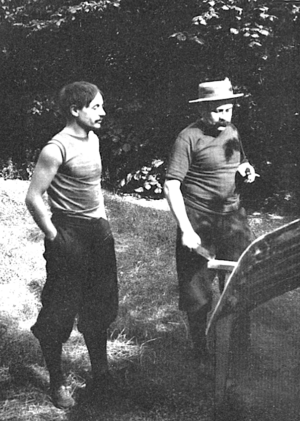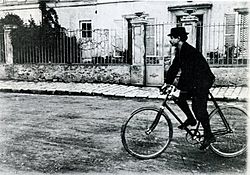Alfred Jarry facts for kids
Quick facts for kids
Alfred Jarry
|
|
|---|---|

Jarry in 1896
|
|
| Born | 8 September 1873 Laval, Mayenne, France |
| Died | 1 November 1907 (aged 34) Paris, France |
| Occupation | Writer and dramatist |
| Nationality | French |
| Genre | 'Pataphysics |
Alfred Jarry (8 September 1873 – 1 November 1907) was a French writer. He is famous for his play Ubu Roi (1896). This play is seen as an early example of art movements like Dada and Surrealism. Jarry also created the idea of 'pataphysics.
Jarry was born in Laval, Mayenne, France. His mother was from Brittany. He wrote many different kinds of works. These included novels, poems, and short plays. His writings are known for being absurd and unique.
Contents
Alfred Jarry's Life and Works
Alfred Jarry's father, Anselme Jarry, was a salesman. His mother, Caroline, loved music and books. His mother's family had some mental health challenges. Alfred had one older sister, Charlotte. In 1879, his mother left his father. She took the children to Saint-Brieuc in Brittany.
In 1888, Jarry's family moved to Rennes. There, 15-year-old Jarry went to high school. He and his friends liked to make fun of their physics teacher, Mr. Hébert. He was a kind but large and clumsy man. Jarry and his friend, Henri Morin, wrote a play. They called it Les Polonais. They performed it with puppets.
The main character was Père Heb. He was a clumsy person with a big belly. He had a strange body. Later, in Jarry's play Ubu Roi, Père Heb became Ubu. Ubu is one of the most unusual characters in French literature.
At 17, Jarry finished high school. He moved to Paris to study for a special college. He was not accepted, but his poems became well-known. A collection of his early works was published in 1893.
That same year, Jarry got sick with the flu. His mother and sister took care of him. After he got better, his mother got sick and passed away. Two years later, his father also died from the flu.
In 1894, Jarry joined the army. He was quite small, and his army uniform was much too big for him. This made him look very funny. He was excused from parades and marching. The army eventually let him go for health reasons. His time in the army inspired his novel Days and Nights.
Jarry returned to Paris and focused on writing. He spent time with friends who liked his clever and funny conversations. During this time, he worked on an art magazine called L'Ymagier. This magazine focused on the symbolic meaning of old prints.
Symbolism was a popular art movement then. L'Ymagier brought together many important artists. Jarry's play Caesar Antichrist (1895) was influenced by this movement. This play mixes serious symbolic ideas with Jarry's unique humor. It talks about a world where Christ returns. But he is not just a spiritual leader. He is also a powerful figure of the Roman Empire.
The character Ubu Roi first appears in this play.
In 1896, Jarry's five-act play Ubu Roi was published. This was a longer version of his school play, Les Polonais. Ubu Roi was very funny and absurd. It was unlike anything seen in French theater before. Many thought it would never be performed on stage. But a brave theater director, Aurélien-Marie Lugné-Poe, decided to produce it.
The first night of the play was on December 10, 1896. Both traditional and modern audiences were there. King Ubu, played by Firmin Gémier, started the play with a shocking word. This caused a lot of noise and chaos in the audience. People were either angry or cheering. The play was only performed twice at that time. It was not shown again until after Jarry passed away.
The play made 23-year-old Jarry famous. He began to act like his character, Ubu. The actor playing Ubu had copied Jarry's own way of speaking. From then on, Jarry always spoke in this strange, choppy way. He used Ubu's silly phrases. For example, he called himself "we" (like a king). He called the wind "that which blows." He called his bicycle "that which rolls."
Jarry moved into a very unusual apartment. It was made by dividing a larger apartment in half, but horizontally! Jarry was short, so he could stand up. But his guests had to bend over or crouch.
With his friends, Jarry started the Théâtre des Pantins. In 1898, they performed Ubu Roi with puppets there.
Jarry lived in increasing poverty and did not take care of his health. He wrote the novel Le Surmâle (The Supermale). This book makes fun of the idea of becoming superhuman.
Another important work was Exploits and Opinions of Dr. Faustroll, Pataphysician. It was published after he died. This book describes the adventures of a kind of anti-philosopher. This character, Dr. Faustroll, is born at age 63. He travels through Paris in a sieve. He believes in the ideas of 'pataphysics.
'Pataphysics is about "the laws that govern exceptions." It tries to explain a universe that is extra to our own. In 'pataphysics, every event is seen as extraordinary. Jarry once wrote, "If you let a coin fall and it falls, the next time it is just by an infinite coincidence that it will fall again the same way."
In his last years, Jarry was seen as a legendary figure by young writers and artists in Paris. Famous artists like Pablo Picasso were fascinated by Jarry. After Jarry died, Picasso bought his revolver. He also bought many of Jarry's writings.
Alfred Jarry passed away in Paris on November 1, 1907, from tuberculosis. He was buried in the Cimetière parisien de Bagneux, near Paris.
His complete works are published in three books by Gallimard.
Selected Works
Plays
- César-Antéchrist (1895) – (Caesar Antichrist) – This play introduces the character Père Ubu.
- Ubu Roi (1896) – (Ubu Rex) – This play shows Père Ubu's desire for power.
- Ubu Enchaíné (1899) – (Ubu in Chains) – This play shows Père Ubu working for others.
- Ubu Sur La Butte (1906)
Novels
- Les Jours et Les Nuits, roman d'un déserteur (1897) – (Days and Nights, novel of a deserter). This is a fictional story about life in the army.
- Le Surmâle (1902) – (The Supermale) – This novel features a superhuman bicycle race.
- Gestes et Opinions du Docteur Faustroll, Pataphysicien (published 1911) – This novel explains the ideas of 'pataphysics.
Other Notable Works
- Short story La Passion considérée comme course de côte (The Passion Considered as an Uphill Bicycle Race).
- Comic operetta The Pope's Mustard-Maker (Le Moutardier du pape).
- Les Minutes de Sable Memorial (1894) – A collection of early short works.
- La Chandelle Verte: Lumières sur les Choses de ce Temps – (The Green Candle) – A collection of absurd essays. They discuss current topics in a funny way.
- Illustrated Almanac of Père Ubu (1899 and 1901).
Images for kids
See also
 In Spanish: Alfred Jarry para niños
In Spanish: Alfred Jarry para niños
 | Lonnie Johnson |
 | Granville Woods |
 | Lewis Howard Latimer |
 | James West |





